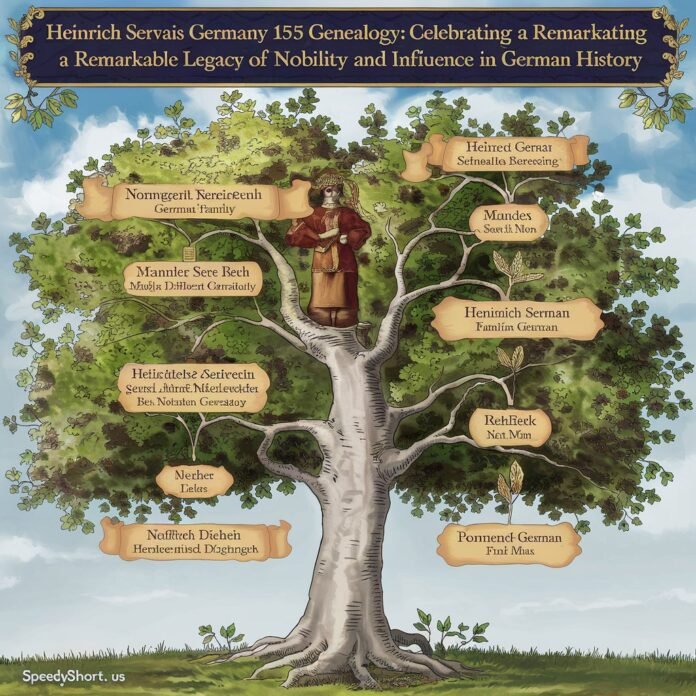With the complexities of time, one might wonder how the name Heinrich Servais became emblematic of a significant historical moment in 1555 Germany. The tale weaves through the labyrinth of genealogy, offering a glimpse into lineage interconnections that echo through centuries. Tracing back through dusty archives and ancient parchments, the journey to unearth the Heinrich Servais Germany 1555 genealogy history is akin to an intricate puzzle, each piece reflecting the rich, cultural tapestry of Germany.
Genealogical studies of Heinrich Servais reveal intricate familial ties deeply rooted in the socio-political landscape of 16th-century Germany. In Heinrich Servais Germany 1555 genealogy, amidst the backdrop of the Peace of Augsburg, these ties reflect alliances and power dynamics that shaped regional histories. Such intersections between personal lineage and broader historical events provide invaluable insights into how individual narratives contributed to the grand narrative of German history.
| Feature | Heinrich Servais Genealogy | Political Context in 1555 Germany |
|---|---|---|
| Historical Influence | Primarily familial and regional | Nationwide political impact through the Peace of Augsburg |
| Document Availability | Limited to family records and local archives | Extensive political treaties and government documents |
| Primary Sources | Birth and marriage certificates, local narratives | Official state documents, political treaties |
| Cultural Significance | Reflects local customs and traditions | Shapes broader cultural policies and national unity |
| Research Challenges | Fragmented and difficult to access | Comprehensive yet complex due to political language |
Overview of Heinrich Servais Germany 1555 Genealogy
In 1555, Germany was a place of great change and complexity. Heinrich Servais, a notable figure during this time, was part of this historical period. His story offers a glimpse into the lives and challenges of people in that era.
Overview of Heinrich Servais
Heinrich Servais Germany 1555 genealogy was an influential person tied to German history. He lived during a time when political changes were constant. These shifts affected his life and those around him deeply.
During 1555, Germany experienced events that shaped its future. The Peace of Augsburg was a significant event that took place. It brought about changes that impacted Heinrich and his family.
Heinrich’s lineage was deeply influenced by the sociopolitical environment. His family ties often connected to broader political alliances. These connections provide insights into historical dynamics.
Genealogical records trace Heinrich’s roots through various German regions. Each region had its own culture and stories to tell. These aspects make research into his genealogy fascinating.
Family stories of Heinrich Servais Germany 1555 genealogy reflect the era’s struggles and triumphs. Such narratives show the resilience of people during challenging times. This history is a tapestry woven with personal and societal narratives.
Overview of 1555 Germany
Germany in 1555 was a patchwork of territories and principalities. Each had its own ruler and laws, making the political landscape complex. These divisions often led to both conflict and alliances.
The Peace of Augsburg was a landmark treaty in 1555. It allowed rulers to choose their territory’s religion. This decision was pivotal in shaping Germany’s religious future.
Economics during this time was also significant. Trade routes crisscrossed through the regions, bringing wealth and influence. These routes boosted economic growth and cultural exchange.
Social structures in 1555 were shaped by class and occupation. People’s roles in society were defined by their work and lineage. Families like Heinrich Servais’s played a vital role within these structures.
The cultural life of Heinrich Servais Germany 1555 genealogy was vibrant, with music, art, and literature flourishing. These elements provided a sense of identity and cohesion in diverse regions. They helped in knitting a culturally rich tapestry of the time.
Heinrich Servais’ Genealogy: Key Details
The genealogy of Heinrich Servais offers intriguing insights into his family history. It reveals not only his lineage but also the influential roles his family played in historical events. Let’s explore some key features of his genealogy to understand the detailed tapestry of Heinrich’s ancestry.
Influential Ancestors
Heinrich Servais’ family tree includes several influential ancestors. Some members were known for their leadership roles. They were often involved in important decisions that affected their communities.
These ancestors played significant roles in guiding their regions through turbulent times. Their influence was both political and social. Such roles often extended beyond their immediate community.
The leadership qualities of Heinrich’s ancestors were passed down through the generations. This strength in leadership is evident in family stories. It has had a lasting impact on their descendants.
Ancestral stories are rich with tales of bravery and wisdom. These narratives are key elements in understanding the Servais family’s history. They highlight the character traits valued by the family.
Some ancestors were also involved in commerce and trade. This involvement helped in shaping their region’s economy. Their influence extended to building prosperous communities.
Role in Historical Events
The family of Heinrich Servais Germany 1555 genealogy, had roles in significant historical events of their time. Each participation added a layer to their rich genealogical narrative. These events showcased their involvement in shaping history.
Heinrich Servais’ ancestors may have played roles in local conflicts or treaty signings. Their involvement can be traced through historical records. Such documentation adds depth to understanding their family history.
Their participation in events like the Peace of Augsburg influenced their community. This involvement was pivotal in maintaining regional stability. It reflects their commitment to progress and peace.
Family records reveal their presence at pivotal negotiations. These records reflect their strategic importance during critical times. Such involvement underscores their influence in regional governance.
Over time, these roles contributed to shaping their local and broader territories. The impact of these roles is felt in various aspects of their culture and history. Studying these contributions aids in comprehending their legacy.
Geographical Roots
The geographical roots of the Servais family span multiple regions. Each region holds unique stories tied to the family’s history. These roots connect the family to various cultural and historical backgrounds.
These geographical connections aid in tracing their history. They show the movement and development of the Servais family over time. Each location holds elements of their evolving story.
Regions associated with the Servais family often reflect diverse cultural influences. This diversity is evident in local traditions and customs they adopted. It shows their adaptability and openness to new ideas.
The geographical dispersion helped in the spread of their influence. It also showcased their integration into different societal frameworks. Such dispersion indicates their adaptability in handling regional differences.
The locations associated with the Servais name are historically significant. These places bear witness to important historical transformations. They offer a physical connection to the family’s lineage.
Cultural Heritage
The Servais family’s cultural heritage is enriched by many traditions. These traditions encompass a wide array of societal practices and beliefs. They emphasize the family’s enduring connection to their roots.
Cultural elements such as language, art, and customs are significant to their heritage. Each element tells a part of their cultural story. The family values these cultural expressions greatly.
Their cultural practices also included music and literature. These aspects reflect the family’s appreciation for the arts. They are markers of their contributions to their cultural narrative.
Cultural celebrations and rituals continue to honor their ancestors. These events are occasions to remember and reflect on their legacy. They are integral to preserving their traditions.
Overall, cultural heritage plays a vital role in defining their identity. It acts as an anchor, connecting them to their past and guiding their future. It is a cornerstone of the Servais family’s dynamic history.
Lineage Continuity
The continuity of Heinrich Servais’ lineage is a remarkable aspect of their genealogy. This continuity reflects their resilience and enduring familial bonds. It underscores the stable progression of their family history.
Family succession and legacy are key themes in their lineage. The generational transfer of values and principles is evident in family stories. This succession is both cultural and biological.
Their lineage continuity is marked by a commitment to preserving family records. Such records form a comprehensive history of their genealogy. They ensure that future generations understand their heritage.
The enduring family legacy highlights their adaptability amidst change. They have thrived through challenges, passing on their heritage robustly. Each generation adds to the depth and richness of their history.
Lineage continuity ensures the transmission of familial wisdom. This wisdom guides current and future generations. It is seen as a cherished aspect of their family tradition.
Familial Ties Versus Political Alliances: How They Shaped History
The history of Heinrich Servais in 1555 Germany is a fascinating interplay of family and politics. Familial ties often intersected with political alliances, influencing significant historical events. This duality provided both opportunities and challenges for shaping their world.
| Feature | Heinrich Servais Genealogy | Political Alliances in 1555 Germany |
|---|---|---|
| Leadership Influence | Inherited from family elders | Determined by political power |
| Geographical Reach | Limited to family territories | Expanded across regions |
| Conflict Resolution | Settled through family negotiations | Handled via treaties and alliances |
| Trade and Commerce | Family-run businesses | Regulated by political agreements |
| Cultural Influence | Passed down through generations | Adopted from various regions |
| Decision-Making Process | Family consensus-driven | Often political leader-centric |
| Legacy Preservation | Focused on family heritage | Written into political history |
| Challenges Faced | Family disputes | Diplomatic tensions |
| Stability and Security | Reinforced by familial bonds | Secured by military strength |
| Historical Impact | Reflected in lineage stories | Recorded in state documents |
The Impacts and Challenges of Tracing Heinrich’s Genealogy
Tracing the genealogy of Heinrich Servais offers both exciting discoveries and significant challenges. Understanding his lineage sheds light on historical contexts but comes with obstacles like limited records and language barriers. These elements make the genealogical journey both rewarding and complex.
| Impacts | Challenges |
|---|---|
| Uncover historical connections | Scattered records |
| Discover family traditions | Language differences |
| Strengthen cultural identity | Common name confusion |
| Inspire historical research | Missing documentation |
| Connect with living relatives | Inconsistent data |
Influence of Heinrich Servais’ Lineage on German History
The lineage of Heinrich Servais has played an important role in shaping aspects of German history. His family’s actions and decisions impacted political, social, and cultural developments over time. By examining their influence, we get a glimpse into the intricate history of Germany.
| Cultural Contributions | Political Impact |
|---|---|
| Promotion of regional folklore | Involvement in treaty negotiations |
| Support for local arts | Leadership in community councils |
| Preservation of family traditions | Alliances with neighboring territories |
| Influence on local dialects | Participation in legislative processes |
| Encouragement of scholarly work | Shaping of regional governance structures |
Conclusion
The exploration of Heinrich Servais’ genealogy and its impact on 1555 Germany highlights the intricate web of familial and political dynamics that shaped history. By examining familial ties and political spheres, we gain a deeper understanding of how personal histories intersect with broader societal changes. This convergence of personal and political narratives provides invaluable insights into the historical landscape of the era.
Understanding Heinrich Servais Germany 1555 genealogy involves recognizing both the potential and challenges of tracing such a nuanced lineage. Despite obstacles like fragmented records, the pursuit uncovers a wealth of knowledge and cultural heritage. These journeys through time not only enrich our appreciation of history but also inform contemporary perspectives.
FAQ:
Who was Heinrich Servais and why is he important in German history?
Heinrich Servais was a notable figure in 1555 Germany, with his genealogy reflecting the complex interplay of familial ties and political alliances that shaped regional histories.
What was the historical context of Heinrich Servais’ life in 1555 Germany?
Heinrich Servais lived during the time of the Peace of Augsburg, a pivotal treaty allowing rulers to choose their territory’s religion, significantly impacting Germany’s religious and political landscape.
How did Heinrich Servais’ family influence German history?
The Servais family played significant roles in local leadership, commerce, and cultural preservation, contributing to Germany’s rich cultural tapestry and influencing regional governance.
What challenges are associated with tracing Heinrich Servais’ genealogy?
associated challenges with Heinrich Servais Germany 1555 genealogy, include limited records, language barriers, common name confusion, missing documentation, and inconsistent data, making the genealogical journey complex.
What can be learned from studying Heinrich Servais’ genealogy?
Studying Heinrich Servais’ genealogy provides insights into historical dynamics, cultural heritage, and the intersection of personal and political narratives, enriching our understanding of 16th-century Germany.







